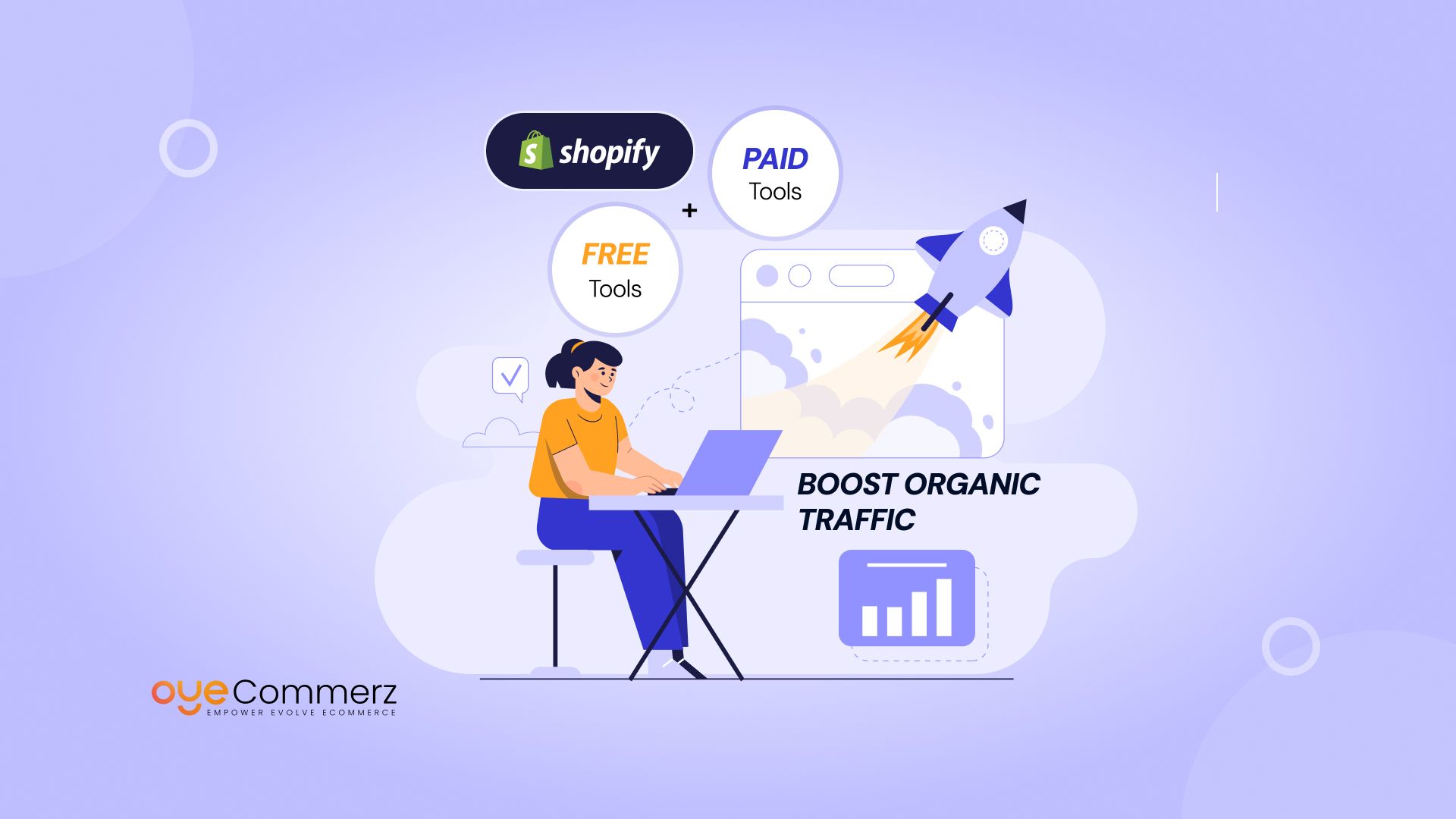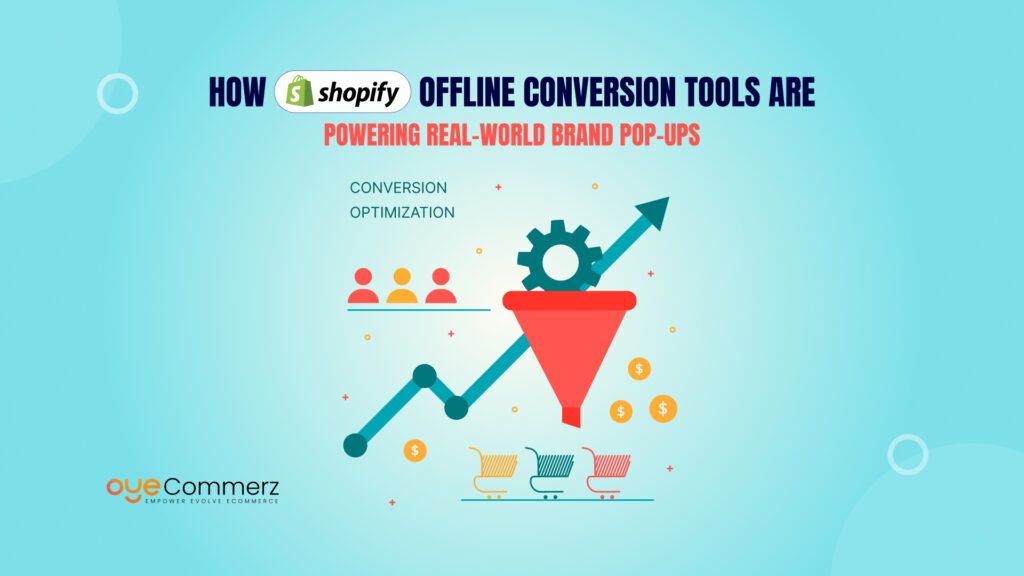Did you know that 68% of online experiences begin with a search engine, and over 75% of users never scroll past the first page of Google?Thousands of Shopify stores are fighting for the same digital shelf space. But without a solid SEO strategy, even the most beautifully designed storefronts stay hidden from search results.
You’re investing in products, marketing, and design — but your organic traffic is barely moving. Sound familiar?
That’s because Shopify, while powerful, doesn’t handle all SEO aspects out-of-the-box. From duplicate meta tags to slow-loading images, technical SEO issues pile up fast. And manually fixing them? It’s a nightmare if you’re not an expert.
That’s where Shopify SEO tools come in. Whether you’re a new store owner or a seasoned e-commerce marketer, the right tools can:
- Uncover profitable keywords
- Fix on-site SEO issues automatically
- Optimize content and images for search
- Track rankings and performance with ease
In this guide, we’ll walk you through the best free and paid Shopify SEO tools that can boost your organic traffic, improve your visibility on Google, and give your store the attention (and conversions) it deserves.
Table of Contents
ToggleWhy SEO is Non-Negotiable for Shopify Stores
With competition growing daily in the e-commerce space, simply having a Shopify store is no longer enough. If your store doesn’t show up on search engines, you’re effectively invisible to potential customers. That’s where Shopify SEO tools become essential.
Organic Search = Long-Term Growth
Organic traffic is one of the most cost-effective and high-converting channels for online stores. Unlike paid ads, which stop generating clicks the moment you stop paying, SEO delivers sustained traffic and brand visibility over time.
A study by First Page Sage shows that organic search leads to an average conversion rate of 14.6%, compared to just 1.7% from traditional outbound methods. The difference is clear: organic visibility fuels lasting results.
The Challenges Without SEO Tools
Shopify offers a strong foundation, but it doesn’t handle SEO comprehensively out of the box. Many store owners encounter issues like:
- Duplicate title tags and meta descriptions
- Poorly structured URLs
- Missing alt tags for images
- Slow site speed and unoptimized media
- Lack of schema markup and structured data
Fixing these manually can be time-consuming and technical. That’s where the right Shopify SEO tools can save time, reduce errors, and ensure that your site is fully optimized for search engines like Google and Bing.
Investing in the Right Tools = Competitive Advantage
E-commerce is growing, but so is the competition. If your competitors are using advanced SEO tools to rank higher, attract more traffic, and increase conversions—then staying passive is not an option.
Shopify SEO tools are not just for experts. They’re for anyone serious about growing their store, from solo entrepreneurs to large teams managing multiple product lines.
In the next sections, we’ll explore beginner-friendly tools, advanced analytics platforms, and everything in between—so you can choose the solutions that match your goals.
For Beginners: What is Shopify SEO?
If you’re new to e-commerce, the term Shopify SEO might sound technical — but it’s simply the process of making your Shopify store more visible on search engines like Google.
SEO stands for Search Engine Optimization, and in the Shopify context, it involves improving your store so that potential customers can find you when they search for products online.
Why SEO Matters for Your Shopify Store
When someone searches for a product you sell, your goal is to show up near the top of the search results. Higher visibility means more clicks, more traffic, and ultimately, more sales. Without proper SEO, your store might not appear at all — even if your products are exactly what the shopper is looking for.
Common Shopify SEO Challenges for Beginners
While Shopify is a user-friendly platform, it does not automatically optimize every element of your store for search engines. Some common issues beginners face include:
- Missing or duplicate meta titles and descriptions
- Unoptimized product images
- Lack of keyword targeting in product pages and blogs
- Poor mobile performance or slow page speed
- URL structures that are not search-friendly
How Shopify SEO Tools Help
This is where Shopify SEO tools come into play. These tools simplify the entire optimization process so you don’t have to be an expert in search engine algorithms. They help you:
- Identify SEO errors and suggest fixes
- Add and improve meta tags
- Compress and optimize images
- Track keyword performance and rankings
- Improve page load speed and mobile usability
Whether you’re just starting your first store or managing a growing catalog, using the right SEO tools from the beginning can save time, improve results, and set the foundation for long-term growth.
Types of Shopify SEO Tools You Need
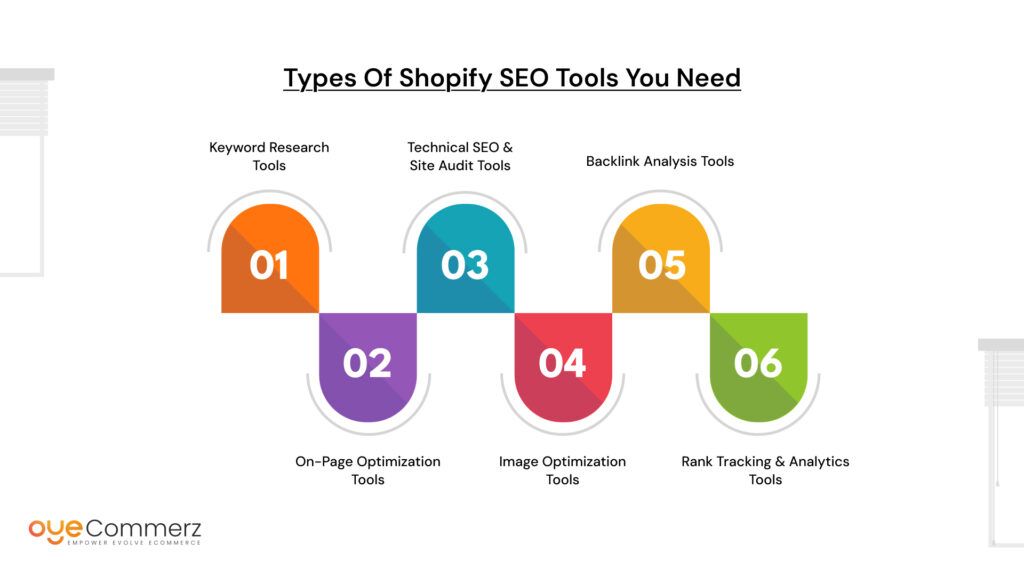
Not all Shopify SEO tools serve the same purpose. Some focus on technical fixes, while others help you discover keywords or monitor search rankings. To build a well-rounded SEO strategy, it’s important to understand the different types of tools available and what role each plays in improving your store’s visibility.
Here’s a breakdown of the core categories of Shopify SEO tools and how they help your store grow:
1. Keyword Research Tools
These tools help you find the right keywords your customers are searching for. By targeting high-volume, low-competition keywords, you can optimize your product pages and content to rank higher in search results.
Examples: Ubersuggest, Ahrefs, SEMrush, Google Keyword Planner
Use Case: Finding search terms to target in product titles, descriptions, blog posts, and meta tags.
2. On-Page Optimization Tools
These tools assist in optimizing individual pages of your store — including product pages, collections, and blogs — so they meet SEO best practices.
Examples: Yoast SEO for Shopify, Smart SEO, Plug In SEO
Use Case: Adding meta titles and descriptions, optimizing headings, fixing duplicate content, and improving page structure.
3. Technical SEO & Site Audit Tools
Technical SEO tools scan your Shopify site for errors that impact search engine performance, such as broken links, crawl issues, or slow page speeds.
Examples: Screaming Frog, Ahrefs Site Audit, SEMrush Site Audit, SEO Manager
Use Case: Identifying and resolving backend issues that prevent your site from ranking well.
4. Image Optimization Tools
These tools reduce the file size of images without sacrificing quality, improving site speed — which is a critical SEO factor.
Examples: TinyIMG, Crush.pics
Use Case: Compressing product and banner images to improve load times and mobile performance.
5. Backlink Analysis Tools
These tools help you track and analyze backlinks — links from other websites to yours. Backlinks are a key ranking factor in Google’s algorithm.
Examples: Ahrefs, Moz Pro, Majestic
Use Case: Monitoring the quality and quantity of backlinks, identifying opportunities for outreach, and disavowing spam links.
6. Rank Tracking & Analytics Tools
Rank tracking tools show how your keywords are performing in search engines over time. They also provide data on traffic, user behavior, and conversion.
Examples: Google Search Console, Moz, SEMrush, ProRankTracker
Use Case: Tracking keyword rankings, monitoring site performance, and measuring SEO ROI.
By combining tools across these categories, you’ll be able to build a complete SEO system for your Shopify store — one that improves rankings, increases visibility, and drives steady, long-term traffic.
Best Free Shopify SEO Tools (With Features & Use Cases)
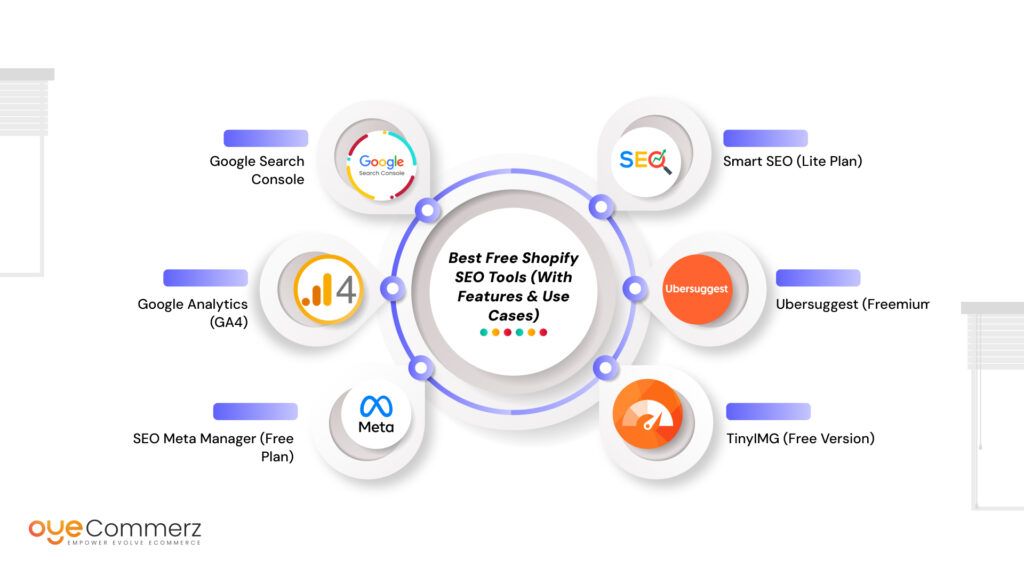
Getting started with SEO doesn’t have to mean spending a lot of money. In fact, some of the most powerful Shopify SEO tools are free or offer strong freemium plans that deliver real value — especially for new store owners and small businesses.
Here are some of the best free tools to help you identify issues, optimize content, and improve your Shopify store’s visibility in search engines.
1. Google Search Console
Best For: Monitoring your site’s performance on Google
Key Features:
- Tracks keyword rankings and search impressions
- Detects indexing issues and crawl errors
- Shows which pages are getting clicks from search
Why Use It: It’s an essential tool for understanding how Google sees your site and identifying opportunities for improvement.
2. Google Analytics (GA4)
Best For: Tracking traffic and user behavior
Key Features:
- Monitors user activity, conversion paths, and bounce rates
- Helps evaluate SEO performance based on organic traffic
- Integrates with Search Console for deeper insights
Why Use It: It gives you real data on what’s working and what’s not, helping you make smarter optimization decisions.
3. SEO Meta Manager (Free Plan)
Best For: On-page SEO editing inside Shopify
Key Features:
- Customize meta titles and descriptions
- Identify pages missing SEO content
- Preview how your pages look in search results
Why Use It: Ideal for Shopify users who want more control over their on-page SEO without touching code.
4. TinyIMG (Free Version)
Best For: Image compression and SEO optimization
Key Features:
- Compresses product and theme images
- Adds alt tags automatically
- Provides image SEO score and suggestions
Why Use It: A fast-loading store is essential for rankings and user experience, and TinyIMG helps you achieve that.
5. Ubersuggest (Freemium)
Best For: Keyword research and site audits
Key Features:
- Discover keyword ideas with search volume and difficulty
- Perform SEO audits and backlink analysis
- Track keyword rankings
Why Use It: A user-friendly keyword tool perfect for beginners who want to find SEO opportunities without complexity.
6. Smart SEO (Lite Plan)
Best For: Automating meta tags and structured data
Key Features:
- Generates meta titles and descriptions based on templates
- Adds structured data for rich snippets
- Detects broken links
Why Use It: It helps automate the basics of SEO for Shopify users who want fast, consistent results.
These free Shopify SEO tools provide an excellent starting point, especially if you’re just launching your store or managing SEO on your own. While they may have limitations compared to paid tools, they offer more than enough to build a strong SEO foundation.
Contact to Migrate your Site to Shopify Now
Top Paid Shopify SEO Tools for Serious Growth
While free tools offer a solid starting point, paid Shopify SEO tools provide advanced functionality, automation, and insights that are critical for scaling your business and staying ahead of competitors. These tools are ideal for stores with high product volume, larger teams, or aggressive growth goals.
Here are the top paid SEO tools used by successful Shopify stores:
1. Ahrefs
Best For: Comprehensive SEO analysis
Key Features:
- Industry-leading backlink database
- Advanced keyword research with competitive analysis
- Site audit tool for technical SEO
Why It Stands Out: Ahrefs gives you deep insights into both your own site and your competitors’, making it ideal for data-driven strategy.
2. SEMrush
Best For: All-in-one SEO and digital marketing
Key Features:
- In-depth keyword tracking and research
- On-page SEO recommendations
- Competitive traffic analytics
- Backlink and site audit tools
Why It Stands Out: SEMrush is a full-suite platform that combines SEO, PPC, and content tools—great for stores running multi-channel campaigns.
3. Plug In SEO Plus (Shopify App)
Best For: Ongoing SEO monitoring within Shopify
Key Features:
- Real-time error scanning and alerts
- Structured data support
- Meta optimization and page speed tips
Why It Stands Out: It’s designed specifically for Shopify and provides continuous feedback, ideal for merchants who want SEO help directly in their dashboard.
4. Moz Pro
Best For: User-friendly SEO with excellent support
Key Features:
- Rank tracking and keyword insights
- Link building and site crawler
- Page optimization guidance
Why It Stands Out: Moz combines technical strength with ease of use, making it a solid choice for small to mid-sized Shopify businesses.
5. SEO Manager by venntov
Best For: Shopify-exclusive SEO management
Key Features:
- 20+ SEO checks built for Shopify
- Integrates with Google Search Console
- Supports structured data and redirects
Why It Stands Out: Tailored for Shopify users, it makes technical SEO tasks more approachable and manageable.
6. Surfer SEO
Best For: Content-focused SEO optimization
Key Features:
- AI-based content guidelines and scoring
- Keyword density and SERP analysis
- Real-time optimization suggestions
Why It Stands Out: Perfect for content marketing strategies, blog SEO, and optimizing product descriptions based on live search data.
Choosing the Right Paid Tool
When evaluating which Shopify SEO tools to invest in, consider the size of your store, your in-house SEO knowledge, and how hands-on you want to be. Paid tools save time, reduce guesswork, and offer automation that delivers ROI quickly—especially in competitive niches.
Shopify SEO Tools Comparison: Free vs Paid
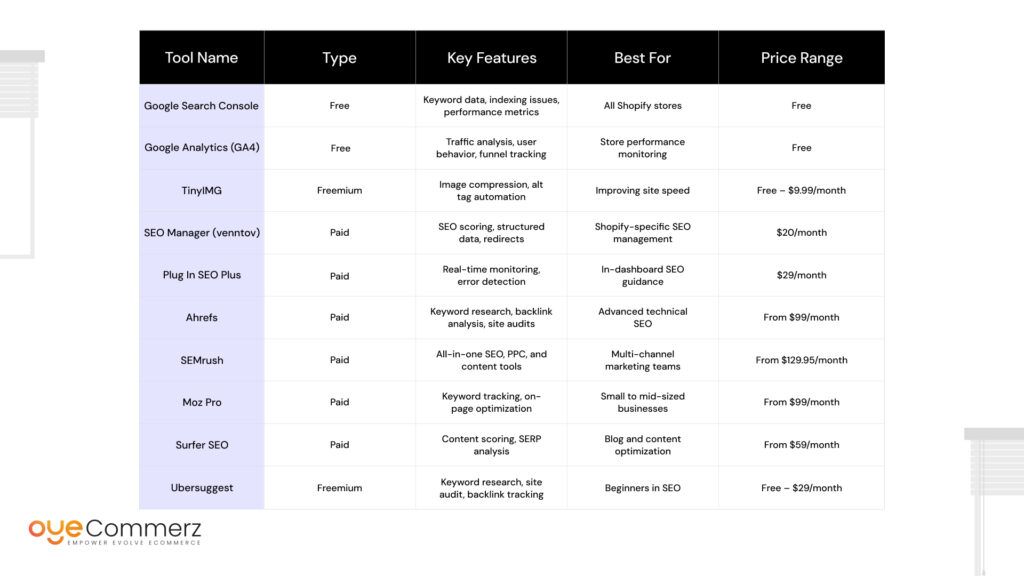
Choosing the right Shopify SEO tools depends on where you are in your e-commerce journey. Some stores may benefit from simple tools that fix basic issues, while others need in-depth features for competitive SEO strategies.
The table below compares key features of popular free and paid SEO tools to help you identify what best suits your business needs.
Key Takeaways:
- Free tools are ideal for startups or stores just getting familiar with SEO. They cover essential tasks like keyword tracking, basic optimization, and performance monitoring.
- Paid tools are worth the investment if you want automation, deeper analytics, and long-term growth. They are especially valuable for competitive industries or larger catalogs.
By understanding what each tool offers, you can build a toolkit that aligns with your goals, team size, and technical skill level.
How Oyecommerz Can Help with Shopify Migration and SEO
Migrating to Shopify or optimizing your current store can be a complex process, especially when you want to make sure that your store’s SEO is fully intact during the transition. Whether you’re new to Shopify or upgrading from a platform like Magento, Oyecommerz is here to guide you through every step of the way.
Expert Shopify Migration with SEO in Mind
At Oyecommerz, we specialize in seamless Shopify migration services, ensuring that all your products, customer data, and content are transferred accurately while maintaining or improving your SEO rankings. Our team understands the critical importance of a smooth migration — we ensure that the technical SEO aspects, such as URL redirects, meta tag transfers, and structured data, are properly handled so you don’t lose your search visibility.
We take care of:
- Mapping old URLs to new Shopify URLs
- Maintaining metadata (titles, descriptions, keywords)
- Keeping your internal links intact
- Ensuring a fast and mobile-friendly Shopify store
- Implementing structured data for enhanced search results
SEO Strategy and Optimization for Shopify
Once you’re on Shopify, we don’t stop at the migration. Oyecommerz offers Shopify SEO services tailored to your store’s unique needs. We’ll guide you on optimizing your product pages, blog posts, and other content so that you rank higher in search results. Our team uses the best Shopify SEO tools to identify areas for improvement, such as:
- Keyword research and optimization
- On-page SEO fixes for product pages
- Image optimization for faster load times
- Backlink building and local SEO strategies
Whether you’re migrating to Shopify for the first time or looking to revamp your existing store, Oyecommerz ensures your SEO efforts are aligned with industry best practices.
Why Choose Oyecommerz?
- Expertise: Our team has extensive experience with Shopify and SEO, ensuring that your store is in good hands.
- Custom Solutions: We provide tailored solutions to meet your store’s specific SEO and business needs.
- Results-Driven: We focus on results, using the latest Shopify SEO tools and techniques to drive traffic and improve conversions.
- Ongoing Support: Our job isn’t done after migration. We provide continuous support to ensure your SEO remains strong as you grow.
If you’re looking for a stress-free migration to Shopify with top-tier SEO optimization, Oyecommerz is your go-to partner.
Conclusion
In today’s competitive e-commerce landscape, leveraging the right Shopify SEO tools is not just an option — it’s essential for your store’s growth and visibility. Whether you’re just getting started or looking to optimize your store for better performance, there’s a wide range of free and paid tools available to help you achieve your SEO goals.
From keyword research and on-page optimization to technical SEO and image compression, these tools help you cover all aspects of SEO, ensuring your Shopify store ranks higher in search results, attracts more organic traffic, and converts visitors into customers.
As you embark on your Shopify journey, don’t forget that SEO is a long-term investment. The right tools, paired with consistent effort, will lead to sustained traffic growth and stronger business performance.
If you’re planning to migrate to Shopify or need expert guidance on optimizing your current store, Oyecommerz offers comprehensive Shopify migration and SEO services. Our team ensures a smooth transition while keeping your SEO intact, and we’ll help you implement the best SEO practices tailored to your store’s needs.
Take action today by investing in the right Shopify SEO tools and professional support. Your store’s success starts with making the right decisions — and Oyecommerz is here to help you every step of the way.
Frequently Asked Questions
Free tools like Google Search Console, Google Analytics, TinyIMG, and Ubersuggest are excellent starting points for new Shopify store owners. They help with keyword tracking, performance monitoring, and on-page optimization without any cost.
Ensuring your Shopify theme is mobile-responsive is crucial. Most Shopify themes are designed to be mobile-friendly, but it’s essential to verify their appearance on various devices. Additionally, using mobile-friendly fonts and images can enhance user experience.
Common mistakes include neglecting mobile optimization, using duplicate content, and having slow page load times. It’s also vital to ensure that all pages are properly indexed and that redirects are correctly implemented, especially after migrations.
Keyword research involves identifying terms and phrases your potential customers use when searching for products like yours. Tools like Google Keyword Planner, Ubersuggest, and SEMrush can assist in finding high-value keywords to incorporate into your product listings, meta tags, and other content.
Technical SEO involves optimizing your store’s infrastructure to help search engines crawl and index your site more efficiently. This includes improving site speed, ensuring proper site structure, and fixing issues like broken links or missing meta tags. A strong technical foundation directly impacts your store’s ranking on search engine results pages (SERPs).
A clean and descriptive URL structure is essential for SEO. Ensure that URLs are short, include relevant keywords, and are easy to read. For example, use “yourstore.com/organic-cotton-t-shirt” instead of “yourstore.com/product123”. Avoid using unnecessary parameters and ensure consistency across your site

